Transition Conference Helps DSCC Participants Prepare for Adulthood
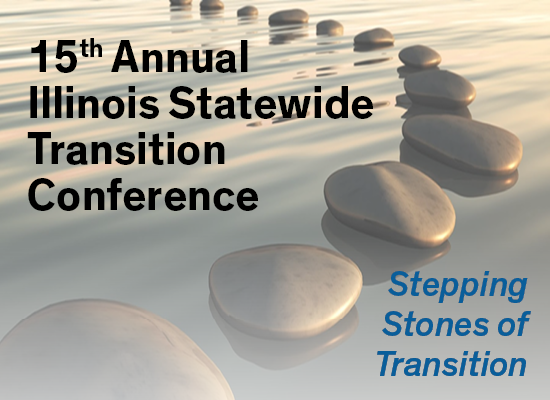
Families and professionals from around Illinois attended the annual Stepping Stones of Transition Conference to improve outcomes for transition-age youth with disabilities.
More than 550 families and professionals gathered at the 15th annual Illinois Statewide Transition Conference to gain skills, resources and information to help youth with disabilities prepare for adulthood.
The conference, titled “Stepping Stones of Transition,” took place Oct. 17-18 in Collinsville.
The event targets adolescents, parents, caretakers, vocational professionals, healthcare professionals, educators and others involved with improving outcomes for transition-age youth with special needs. It highlights the opportunities and resources available for youth as they, their families and support teams plan and prepare for the future.
The University of Illinois at Chicago’s Division of Specialized Care for Children (DSCC) served on the steering committee to plan this year’s conference.
DSCC also covered the conference-related expenses for 23 participant families across the state. Part of DSCC’s mission is to connect adolescents with special healthcare needs and their families to resources that prepare them for the transition to adulthood and adult services.
Lily Dining is the mother of 14-year-old Paulina, a participant in DSCC’s program. This year’s conference was their first time attending.
“We have learned so much, to the point where I don’t know what I want to do first. It’s been so informative and we are well taken care of,” Lily said of DSCC paying for their conference fees and hotel stay.
Lily appreciated that DSCC made sure Paulina, who uses a wheelchair, had an accessible hotel room.
“Everything was so smooth and well-organized.,” she said. “I was free to just learn and not have to worry about how I was going to pay for it.”
Nineteen-year-old DSCC participant Joy attended the conference with her aunt Cecilia. They found several breakout sessions helpful as Joy begins to plan to enter the workforce. Cecilia said she’s eager to work with Joy to identify her strengths and pinpoint jobs that would be a good match.
Joy and Cecilia also enjoyed attending a special meet-and-greet for DSCC families and staff who were at this year’s conference.
The conference consisted of informative breakout sessions in the areas of:
- Independent Living
- Education and Training
- Employment
- Community Integration
- Health Care
- Self-Advocacy
DSCC participant Collin Monical, 18, attended the conference with his parents. His father, Greg, said each person in their group had different perspectives about transition and found sessions that addressed each of their interests and concerns.
Greg said most of his selected sessions involved help with government programs.
“I was not only impressed with the educational benefits of governmental programs. The human aspects presented through these talks were most enlightening,” he said.
Greg said he was particularly inspired by keynote speaker LeDerick Horne, who discussed his own experiences growing up with a learning disability. LeDerick is now a disability advocate, motivational speaker and spoken-word poet.
“Hearing these positive stories is just incredible… As parents, we tend to see a lot of the negative about disability. Every once in a while, you have to step back to see how far our children really have come,” Greg said.
“We will dwell on the materials presented from the conference for a long while. I believe that we now know more about what is out there and could perhaps ask more pointed questions in the future. Thank you so very much for the assistance provided to make this into a reality.”
More than 20 DSCC staff members also attended the conference to network, learn from others and strengthen their skillsets and the tools they use to serve our families.
DSCC Family Advisory Council member Joyce Clay, who is a professor of nursing at Richland Community College, presented a breakout session on the “The Joys and Challenges of Medical Transition.” Joyce shared her experiences with her own daughter’s complex medical needs and the strategies she has learned to enhance the transition process as her daughter moved from the pediatric to adult setting.
Additionally, DSCC sponsored the conference’s health care track for providers who play a role in the transition from the pediatric to adult healthcare system and those who build youth’s capacity and healthcare skills to prepare for adulthood.
“This year’s conference was a great success helping improve transition outcomes for youth with disabilities/special healthcare needs,” DSCC Statewide Transition Coordinator Darcy Contri said. “I am so happy to have had the opportunity to be involved for the 15 years that DSCC has helped host this conference. It just keeps getting better each year.”
Visit DSCC’s Facebook page to see photos and more information about this year’s conference
Autism Webinar Series
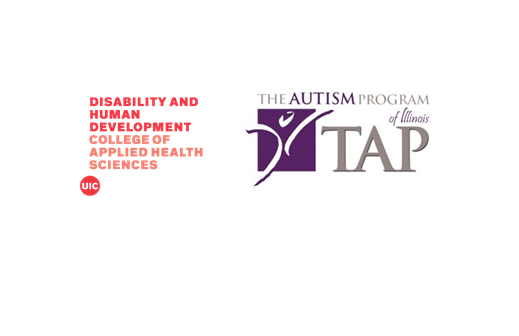
Learn from experts in the field about assistive technology, post-transition, behavior planning and early detection and intervention.
The University of Illinois at Chicago’s Institute on Disability and Human Development and The Autism Program of Illinois (TAP) are kicking off a series of webinars in honor of Autism Awareness Month.
The webinars will discuss many aspects of autism, including interventions and strategies to improve quality of life and important information on the systems that affect individuals with autism spectrum disorder.
The webinars will feature experts from across the field. Continuing education units will also be available for all webinars.
To register, visit www.accessibilityonline.org/IDHD.
Schedule details are available below by topic:
Assistive Technology Series
- April 10, 1-2 p.m.
“AT Tools for Independence – Electronic Aids to Daily Living” - April 29, 1-2 p.m.
“AT Communication Tools and Strategies” - May 9, 1-2 p.m.
“AT Tools and Resources for Latinx Families” - May 16, 1-1:30 p.m.
“AT Creating Individualized Communication Profiles”
(.5 continuing education units available only in conjunction with one other ATU webinar)
Post-Transition
- April 11, 1-2 p.m.
“Accessing Adult Services in Illinois” - May 23, 1-2 p.m.
“What Happens after High School? Transition to College for Autistic and Disabled Youth” - May 30, 1-2 p.m.
“ABLE Accounts”
Behavior Planning
- April 18, 2-3 p.m.
“Understanding and Improving Behavior: A Sensible Approach” - June 20, 1-2 p.m.
“ABA Basics: Recognizing Good and Bad Behavior Plans”
Early Detection and Intervention
- June 13, 1-2 p.m.
“Early Detection of Autism” - June 27, 1-2 p.m.
“A Look at Alternative Interventions”
Questions? Please contact Susan Kahan at skahan@uic.edu.
Mother-Son Partnership Helps DSCC Participant Thrive in College
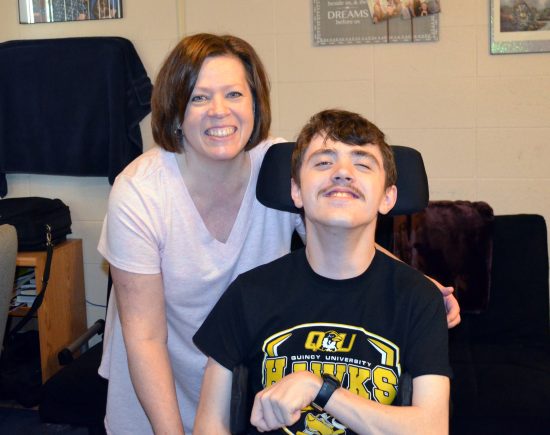
Jacob Flynn is fulfilling his college dreams with help from his mother.
Like many young adults his age, 20-year-old Jacob Flynn headed back to school this fall for his sophomore year of college. But there were no sad goodbyes with his mom, Cheryl.
Cheryl not only drove him to Quincy University (QU) but also lives with him full-time during the week in their own apartment on campus.
Jacob has cerebral palsy and is a participant in the University of Illinois at Chicago’s Division of Specialized Care for Children (DSCC). He requires round-the-clock assistance because of his mobility issues.
Cheryl decided to become Jacob’s personal aide so he can fulfill his dream of earning a college degree.
The mother-son duo says QU has been the perfect fit for Jacob’s needs. It’s also helped him gain a greater sense of independence.
“I always wanted to go to college like everybody else because I knew that was the only way I could get a job,” Jacob said. “Plus, I had advisors at (high) school that gave me options and opportunities to get here.”
Cheryl said she’s always encouraged her son to aim high.
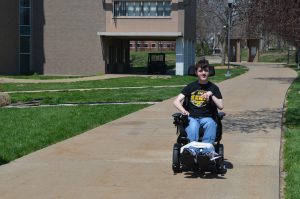
“Just know that it’s possible. Some people will say it’s not, but it is. You have to work hard and try your best and you’ll make it,” Jacob said.
“I’ve always pushed him like a normal child,” she said.
Jacob earned good grades while attending Brown County High School. As he and Cheryl researched college options, they learned that personal aid services would only be available for up to 16 hours.
Cheryl knew that amount isn’t sufficient for Jacob’s needs. She decided to become his personal aide to make sure he received the right accommodations and support.
The next step was finding the right college. Jacob said he was interested in attending a small school so he could easily get around campus. He and Cheryl eventually toured QU, a school of 1,100 students. They immediately felt right at home.
“The people were very nice,” Jacob said.
Cheryl joked that once Jacob saw the pizza oven in the cafeteria, he was sold. Jacob also received an academic scholarship from the college in addition to a scholarship from the Tracy Family Foundation.
The Flynns said QU staff members were extremely helpful in letting them look at available apartments and measuring doorways to ensure Jacob’s wheelchair could fit.
They were able to move into a first-floor, accessible apartment in the center of campus, close to Jacob’s classes and the cafeteria.
While they were moving in, a professor not only helped them unload their van but offered to check if Cheryl could get a discounted meal plan so she could eat with Jacob in the cafeteria. The college’s dining service, Chartwells, offered to let Cheryl eat on campus at no charge. The free meals have been a huge help, she said.
Jacob meanwhile has taken a full load of classes each semester. He initially wanted to major in computer science but changed his mind to focus on history.
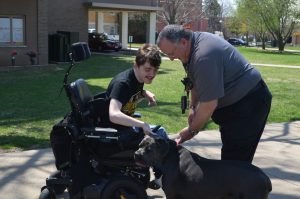
Jacob visits with Quincy University Director of Safety and Security Sam Lathrop and his dog.
During class, Cheryl takes notes for Jacob. He also uses a dictation program to type what he says. Jacob also has extended testing times for exams and tells Cheryl what to write.
Cheryl said that though she is on campus with her son, she does her best to “take off her mom hat” and let Jacob do things that a typical college student would like to do, like eat junk food and go to dinner with friends.
Jacob says he enjoys the greater independence.
He’s become well-known on the Quincy University campus and has met people from around the world.
Jacob earned a 3.9 GPA and was also nominated for QU’s Freshman of the Year. He also received a leadership award.
Jacob and Cheryl say it’s important for youth with disabilities to start their college planning early and make time to speak with college staff and other students.
“Talk to people to make sure they’re accommodating,” Cheryl said. “From the cafeteria to the groundskeepers to the housekeepers, everyone here (at QU) has been so helpful.”
The Flynns also use their DSCC Care Coordinator, Kathy, as a resource to help with any of Jacob’s equipment needs, such as a wheelchair lift for their vehicle, and questions about the transition from pediatric to adult services.
Jacob said he wants his peers to see that people with disabilities are no different than they are. He also wants to encourage other youth with disabilities to stay focused on their goals.
“Just know that it’s possible. Some people will say it’s not, but it is. You have to work hard and try your best and you’ll make it,” Jacob said.
Conference Helps DSCC Families and Staff Prepare for Transition to Adulthood
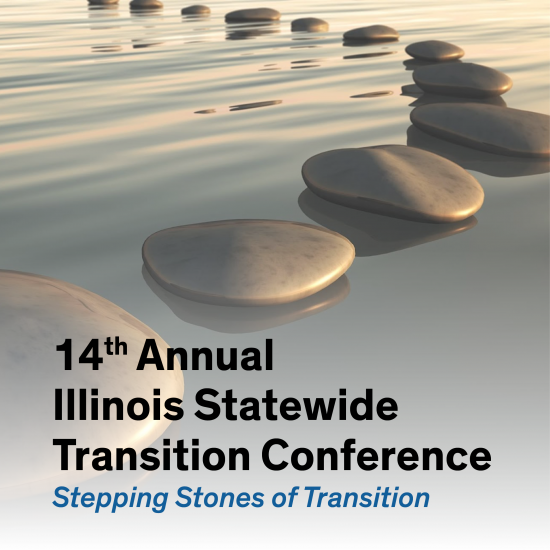
Families and professionals from across the state attended annual Stepping Stones of Transition Conference to help youth with special needs.
More than 700 families and professionals gained valuable knowledge about helping adolescents with special needs prepare for adulthood during the 14th annual Illinois Statewide Transition Conference on Oct. 25-26 in Itasca.
The conference, titled “Stepping Stones of Transition,” is aimed at youth, parents, caretakers, vocational professionals, healthcare professionals, educators and others involved with improving outcomes for transition-age youth with disabilities. It highlights the opportunities and resources available for youth as they, their families and support teams plan and prepare for the future.
The University of Illinois at Chicago’s Division of Specialized Care for Children (DSCC) served on the steering committee to plan this year’s conference.
DSCC also covered the conference-related expenses for 39 of our participant family members across the state. Part of DSCC’s mission is to connect adolescents with special healthcare needs and their families to resources that prepare them for the transition to adulthood and adult services.
Juliette De Nova is the parent of three children in DSCC’s program, including her 15-year-old daughter, Natalie, who has Down syndrome and a heart impairment.
“Natalie is home-schooled, so I’m her teacher, her transition coordinator, I’m the whole kit and caboodle, so there’s a lot to learn,” Juliette said.
She is grateful that DSCC was able to pay for her conference fee and hotel stay.
“I really appreciate it. We’re a single-income family with three kids with medical issues,” she said.
DSCC also coordinated and covered the cost for translation services for non-English speaking participants who attended. One Spanish-speaking parent said she was amazed at how much she was able to learn to prepare for her daughter’s future, all thanks to DSCC’s efforts.
Another teenaged DSCC participant said he was so inspired by the stories he heard that he wants to share his own transition experience at next year’s conference.
The conference consisted of informative breakout sessions in the area of:
- Independent Living
- Education and Training
- Employment
- Community Integration
- Health Care
Former DSCC participant Mary Kate DalCanton, 25, served as the conference’s first youth representative on the conference steering committee. This was her third year attending the conference and she loved having the opportunity to be involved with the planning.
“It’s actually kind of cool,” Mary Kate said.
“A lot of people who come to the conference are teachers and parents,” she added. “One of the reasons I wanted to be on the committee is to get more youth to the conference.”
Mary Kate planned a special Bingo Night for youth only during the conference to give young conference attendees the chance to meet one another and have fun away from their parents.
She solicited donations for prizes for players to encourage more people to participate.
Conference organizers honored Mary Kate for all of her efforts with a special award during the conference luncheon.
“I was very surprised,” Mary Kate said.
More than a dozen DSCC staff members also attended the conference to network, learn from others and strengthen their skillsets and the tools they use to serve our families. DSCC’s Statewide Transition Coordinator Darcy Contri and Care Coordinator Angel Lawrence from our Champaign Regional Office led a discussion on how to put youth at the center of transition planning for healthier outcomes.
Additionally, DSCC sponsored the conference’s health care track for providers who play a role in the transition from the pediatric to adult healthcare system and those who build youth’s capacity and healthcare skills to prepare for adulthood.
During the health care track, Diane Becker of DSCC’s Home Care Quality Improvement and Enrollment Team presented on how providers and professionals can use data on the social determinants for health and success to change interventions and supports for youth in their area.
DSCC Care Coordinator Opal Andraka said she was inspired by her interactions with families from across the state during the conference.
“It was very eye-opening to hear them voice their questions and concerns in an open forum with subject-matter experts. Hearing them tell their stories is always a good way to remind us of our mission,” she said.
DSCC Family Liaison Violet Wiker staffed the Family Oasis Room, which gave families the opportunity to take a break and connect with other families.
DSCC Care Coordinator Autumn DeSilva worked DSCC’s booth at the conference’s exhibit hall. She said it was great to meet our participant families and connect them with their care coordinators in attendance at the conference.
Visit DSCC’s Facebook page to view photos and more information about this year’s conference.
Transition Conference Helps Youth with Special Needs Prepare for Adulthood
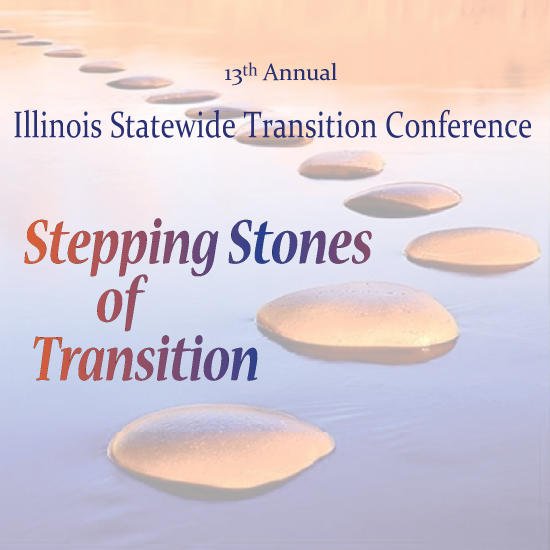
500-plus families and professionals attended the 13th annual Stepping Stones of Transition Conference in Springfield
More than 500 families and professionals learned valuable information about helping adolescents with special needs/disabilities prepare for adulthood during the 13th annual Illinois Statewide Transition Conference on Oct. 23-24 in Springfield.
The conference, titled “Stepping Stones of Transition,” is aimed at youth, parents, caretakers, vocational professionals, healthcare professionals, educators and other key stakeholders Participants were invited to discuss the possibilities for students with disabilities in the areas of independent living, education and training, employment, community integration, health care and self-advocacy. Youth and young adults with special healthcare needs learned how to plan for their future and life after high school, how to sort through the maze of resources and what skills are important to develop to prepare for adulthood and meet their goals.
The University of Illinois at Chicago’s Division of Specialized Care for Children (DSCC) served on the steering committee for this year’s conference and covered the conference-related expenses for 20 of our participant families across the state. Part of DSCC’s mission is to connect adolescents with special healthcare needs and their families to resources that prepare them for the transition to adulthood and the delivery of adult services.
Former DSCC participant Ashley Santiago-Sanchez, 21, attended the conference with her parents and younger brother. Her father, Ivan, said his family wanted to gain as much information and resources as possible to help foster her independence and prepare for adult life in the community.
Saurabh and Mukta Agarwal attended with their teenaged daughter, Radhika, who currently is enrolled with DSCC and requires skilled in-home nursing. Their Care Coordinator made sure that DSCC paid for the family’s registration, hotel, transportation and cost for a daytime nurse for Radhika.
“A lot of times families (like ours) don’t know the options,” Saurabh said of planning for the future with a medically complex child.
Saurabh said he was especially touched by keynote speaker Matt Cohen, who spoke about his experiences with his son and how he learned to determine transition priorities for students and ensure their real-life needs are met. He and Mukta also appreciated the opportunity to make connections with other families and professionals.
“All of the information was very helpful, and now we have to do our homework,” Saurabh said.
Click here to view photos and more information about this year’s conference.
The 2018 Illinois Statewide Transition Conference is scheduled for Oct. 25-26 at the Westin Chicago Northwest Hotel in Itasca.
New Transition Resource for Deaf or Hard of Hearing Teens
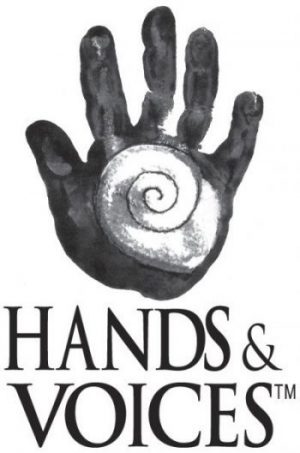
Online learning tools for parents and their transition age teens who are deaf or hard of hearing.
The transition from high school to the workforce or postsecondary education can be difficult to understand and navigate. Hands & Voices has announced the release of its online learning tool specifically for parents and their transition-age teens who are deaf or hard of hearing to support them as they begin this new journey.
Topics covered include:
- Laws and Key Information Parents Need to Know about the Transition Process
- From Parent Advocacy to Student Advocacy
- Technology Transitions
- The Parenting Aspects of Transition
- Strategies to Assist with the Process of Transition
Goals of the learning module are:
- To have a resource for parents and their transition-age teens that will support their exploration of life after high school.
- Parents will report knowledge and confidence in understanding postsecondary transition.
- Transition-age teens will report feeling more knowledgeable and prepared for the transition process.
Intended audience:
- Parents and their transition-age children.
- Teachers and support staff working with transition age students who are deaf or hard of hearing.
For more information and to register, click here.
Click here to read an interview with Lisa Kovcas about the transition tool.
Free Webinar Series on Transition
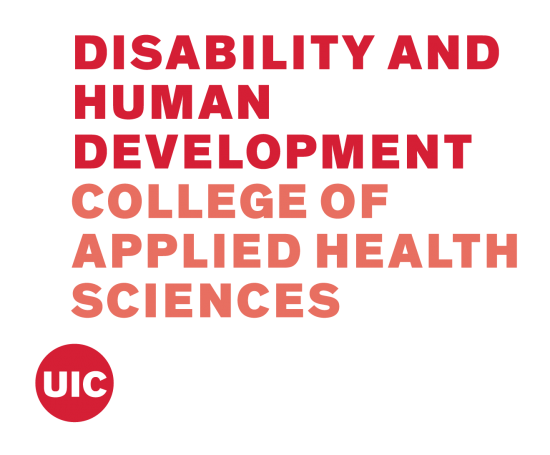
“Next Steps to Adulthood: Planning for Transition” includes a free webinar series and in-person workshop.
The University of Illinois at Chicago Institute on Disability and Human Development (IDHD) Developmental Disability Family Clinics present “Next Steps to Adulthood: Planning for Transition,” a free webinar series and workshop. Families and professionals may register for all or select individual webinars to attend.
WEBINAR SERIES:
- Healthcare Transition of Young Adults with Autism and other Developmental Disabilities to Adult Systems of Care
Date: Wednesday, Oct. 4, 10 to 11 a.m.
Presenter: Kruti Acharya, MD, UIC Department of Disability and Human Development
Dr. Acharya will review the most recent data about healthcare transition for adolescents and young adults with intellectual or developmental disabilities, describe standard of care for health care transition and highlight strategies to support the transition to adult-centered health care. - Understanding the Components of Transition Planning for Youth with Autism
Date: Wednesday, Oct. 18, 10 to 11 a.m.
Presenter: Meghan Burke, Ph.D., BCBA-D, UIUC Department of Special Education
In this presentation, Dr. Burke will outline the components of transition planning for your child with autism. Specifically, she will discuss transition assessments and goals, student involvement and transition outcomes including post-secondary training and education, independent living and employment. - Employment Policy and Services for Transition-Aged Youth with Disability
Date: Wednesday, Nov. 1, 10 to 11 a.m.
Presenter: Kate Caldwell, PhD, UIC Department of Disability and Human Development
This presentation will give an overview of current policy affecting transition-aged youth with disabilities in the workforce. It will also discuss trends in the field, as well as strategies and best practices in disability employment services and supports. Finally, it will provide resources for those wishing to learn more. - What Happens Next? Exploring the World of Adult Services
Date: Thursday, Nov. 9, 10 to 11 a.m.
Presenter: Kathy Carmody, MSW, Institute on Public Policy for People with Disabilities
This presentation will discuss the community service system for adults with intellectual/developmental disabilities in Illinois, including eligibility requirements, funding options, service models and strategies to promote maximum effectiveness and satisfaction with services. Kathy brings over 30 years of experience in Illinois and an extensive background in helping families understand and navigate the adult I/DD community system.
IN-PERSON WORKSHOP:
- Transition Perspectives
Date: Friday, Dec. 8, 10 a.m. to 1 p.m.
Location: First Floor Auditorium, 1640 W. Roosevelt Road, Chicago, IL 60608 (UIC’s Disability, Health and Social Policy Building)
This in-person interactive workshop combines insights from all three webinars to discuss how transition planning impacts daily life, healthcare and employment opportunities. This is your opportunity to learn from three experts on transition best practices. Bring your questions!
REGISTER HERE: https://tinyurl.com/TransitionReg
Questions? Contact Susan Kahan at skahan@uic.edu or (312) 413-2652.
Continuing education credits are available with a $10 fee for professionals in the following disciplines: Advanced Practice Nurses, Registered Nurses, LPNs, Clinical Psychologists, Illinois Teachers Professional Development, LCSW, LSW, LPC, and LCPC, Licensed Dietitian Nutritionists (RD), Nursing Home Administrators, Occupational Therapists, Physical Therapists, Qualified Intellectual Disabilities Professionals and Speech Language Pathologists.
Click here for more information.


